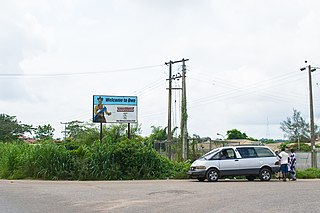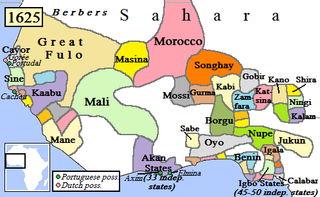Related Research Articles

Owo is a local government area in Ondo state, Nigeria. Between 1400 and 1600 CE, it was the capital of a Yoruba city-state. The local government area has a population of 222,262 based on 2006 population census.

Isonyin is a small town in Ogun State, Nigeria located about 10 kilometers from Ijebu Ode. Administratively, it is part of the Ijebu North-East Local Government Area.
Oba Sir Olateru Olagbegi II, was the King (Olowo) of Owo, an ancient city which was once the capital of an Eastern Yoruba city state in Nigeria.
The Dagburewe of Idowa is one of the major royal titles which has survived within southern Nigeria for over 300 years.

The Akarigbo of Remoland is the royal title of the paramount ruler of the thirty three (33) towns that makes up the Remo kingdom in Ogun state in Nigeria The capital of the kingdom is Sagamu or Shagamu also known as Ishagamu and it is made up of thirteen (13) of the thirty three towns that make up the Remo Kingdom. The thirteen towns that makes up Sagamu that congregated there in 1872 for greater security are : Offin, Makun, Sonyindo, Epe, Ibido, Igbepa, Ado, Oko, Ipoji, Batoro, Ijoku, Latawa and Ijagba. The other twenty (20) are: Ipara, Ikenne, Ogere, Okun-owa, Ilisan, Ibese, Ode Remo, Ilara, Isara, Irolu, Akaka, Ikorodu, Odogbolu, Emuren, Imota, Ijede, Gbogbo, Ikosi, and Ijesa-Ijebu.

The Yoruba of West Africa are responsible for a distinct artistic tradition in Africa, a tradition that remains vital and influential today.
The Itsekiri language is a major branch of the Yoruboid group of languages, which as a group, is a key member of the Volta–Niger sub-family of the Niger–Congo family of African languages. Itsekiri is spoken by nearly 1,000,000 people in Nigeria as a first language and by many others as an additional language notably in the Niger Delta and in parts of Edo and Ondo states of Nigeria. The other key members of the Yoruboid group are Yoruba and Igala along with the various Yoruba dialects spoken in Benin and Togo.

Nigerian traditional rulers often derive their titles from the rulers of independent states or communities that existed before the formation of modern Nigeria. Although they do not have formal political power, in many cases they continue to command respect from their people and have considerable influence in their community.

The Akure Kingdom is a traditional state with headquarters in Akure, Ondo State, Nigeria. It is the successor to an ancient Yoruba city state of the same name. The ruler bears the title "Deji of Akure".

The Olowo of Owo is the paramount Yoruba king of Owo, a city in Ondo State, southwestern Nigeria which was the capital of Yoruba between 1400 and 1600 AD. Ojugbelu Arere, the first Olowo of Owo was the direct descendant of Oduduwa known as the father of the Yorubas. The current Olowo of Owo is His Imperial Majesty, Alayeluwa, Oba Ajibade Gbadegesin Ogunoye III, who is also the 32nd paramount ruler of Owo kingdom. The name Owo meaning Respect, is said to have been coined from the intrigue attitude of Ojugbelu, the first Olowo of Owo who ruled the kingdom from 1019 to 1070.
Ojugbelu Arere was the first Olowo of Owo, a city in Ondo State, southwestern Nigeria. He was a son of Oduduwa Olofin Adimula known as the ancestor of the Yoruba race whose origin was traced to Ile Ife. The name, Owo, meaning Respect was coined from his intrigue attitude. He was succeeded by Olowo Ajagbusi Ekun
This is a list of the royal titles of Yoruba monarchs. It is not in the order of seniority.
The Igogo festival is a Yoruba festival held in Owo, Nigeria. It is held annually in September to honor Queen Oronsen, a mythical wife of Rerengejen. During the festival, the incumbent Olowo of Owo, Oba Ajibade Gbadegesin Ogunoye III, and high chiefs of Owo Kingdom dress like women with coral beads, beaded gowns and plaited hair. The wearing of headgears and caps as well as the beating of drums and firing of guns are forbidden during the festival.
Ijebu-Owo is one of the five quarters that together make up the township of Owo, in Owo local government area of Ondo State, south-western Nigeria. The transmission of courtly culture flowed in both directions between Owo and Benin kingdoms from the seventeenth century till date. Oral tradition claimed that the founders of Owo and Ijebu-Owo were the descendants of Ojugbelu Arere, the first Olowo of Owo who was a descendant of Oduduwa, the pioneer ruler of Ile-Ife. The king of the Ijebu-Owo is called Ojomo Oluda and the incumbent Ojomo Oluda is Oba (King) Kofoworola Oladoyinbo Ojomo, a retired General of the Nigerian Army.

The Ojomo Oluda is the Yoruba king of Ijebu, Owo in Ondo State, southwestern Nigeria. The king is believed to be a descendant of Ojugbelu Arere, the pioneer Olowo of Owo. Ojomo Oluda also celebrates the Igogo festival with the incumbent Olowo of Owo since they are the descendants of the late Olowo Rerengejen, who married Oronsen, the goddess that brought about the annual Igogo festival.

Kofoworola Oladoyinbo Ojomo is the paramount Yoruba king of Ijebu, Owo in Ondo State, southwestern Nigeria. He is a descendant of Ojugbelu Arere, the pioneer Olowo of Owo.

Obalufon Alayemore, also referenced as Ọbalùfọ̀n II or just Alayemore, was the Third Ooni of Ife, a paramount traditional ruler of the Ife Empire. He succeeded his father Obalufon Ogbogbodirin. Obalufon Alayemore was forced out of power by Ooni Oranmiyan and later returned with the help of local residents to reclaim the throne.
The Ìjẹ̀bú people are a Yoruba subgroup hailing from Nigeria. located in the southwest of the country. The Ijebu people speak the Ijebu dialect of the Yoruba language.

Ajibade Gbadegesin Ogunoye III is the Olowo of Owo and paramount Ruler of Owo Land in Ondo state, Nigeria. He succeeded his father Oba Adekola Ogunoye II, the Olowo of Owo, who held the title from 1968 until his passing in 1993. He is the son of Olori Adenike Yeyesa Ogunoye. Oba Ajibade Gbadegesin Ogunoye III was formally presented with the staff of office by the Governor of Ondo State Arakunrin Rotimi Akeredolu on 14 December 2019 marking the beginning of his reign.

The Olowo's palace Aghọfẹn Ọlọghọ, is the largest palace in Africa. It is located in Owo, a local government area in Ondo State, south western Nigeria. And is a pronounced a national monument by the federal government of Nigeria in 2000. The palace holds cultural importance with the occupance by 14 Olowo of owo who ascended the throne since the existence of the palace.
References
- 1 2 3 4 "Owo observes Igogo festival". The Nation. Archived from the original on 1 July 2015. Retrieved 28 June 2015.
- 1 2 3 4 "Royal Rumble in Ijebu, Owo". Vanguard News. Retrieved 28 June 2015.